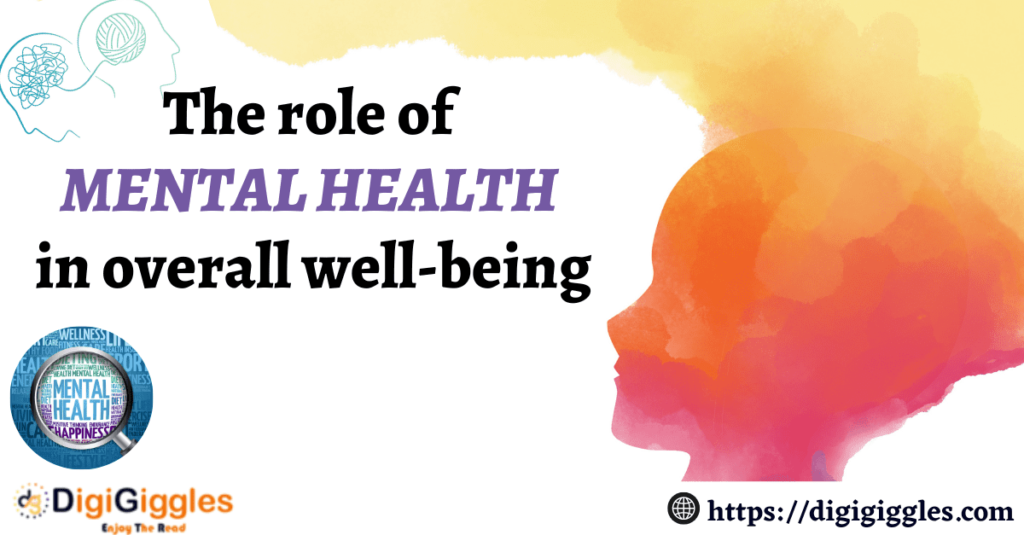Introduction
Mental health plays a pivotal role in our overall well-being influencing every aspect of our lives. Often overlooked or misunderstood mental health is an essential component of our overall health and requires the same attention and care as our physical well-being. In this blog post, we will delve into the significance of mental health and explore how it affects our emotional state, cognitive functioning, physical health, productivity, and interpersonal relationships. By understanding the role of mental health in our lives we can better appreciate its impact and take proactive steps to nurture and prioritize our mental well-being.
Significance of mental health
Mental health holds immense significance in our lives, influencing our overall well-being and quality of life. It affects our thoughts, emotions, and behaviors shaping our perceptions and experiences of the world around us. When our mental health is positive and well-maintained, we are better equipped to handle stress, cope with challenges, and enjoy a sense of inner peace and fulfillment. Good mental health enables us to engage in healthy relationships, make sound decisions, and pursue our goals and aspirations with confidence. It is the foundation upon which we build resilience, self-esteem, and a positive outlook on life.
Conversely, neglecting our mental health can lead to various mental health disorders, impacting our ability to function effectively and diminishing our overall well-being. Recognizing the significance of mental health empowers us to prioritize self-care, seek support when needed, and proactively cultivate a healthy and balanced mindset. By investing in our mental health, we lay the groundwork for a happier, more fulfilling life.
Emotional well-being
Mental health greatly influences our emotional well-being. It encompasses our ability to understand and manage our emotions effectively including feelings of happiness, sadness, anger, and anxiety. Good mental health allows us to experience positive emotions, maintain healthy relationships, and cope with life’s challenges. Conversely, poor mental health can lead to mood disorders such as depression and anxiety, negatively impacting our emotional well-being.
Cognitive functioning
Mental health also plays a vital role in cognitive functioning which refers to our ability to think, reason, and make decisions. When our mental health is optimal we can concentrate, focus and process information effectively. On the other hand conditions like stress, depression or other mental health disorders can impair our cognitive abilities affecting memory, attention, and problem-solving skills.
Physical health
The link between mental and physical health is undeniable. Poor mental health can contribute to the development or exacerbation of physical health conditions such as cardiovascular diseases, weakened immune systems, and chronic pain. Similarly, chronic physical illnesses can have a detrimental impact on mental health leading to increased stress, anxiety, and depression. Taking care of our mental health is thus crucial for maintaining overall physical well-being.
Productivity and performance
Mental health significantly influences our productivity and performance in various areas of life including work, academics, and personal goals. When we have good mental health we are more likely to feel motivated, focused, and energized. Conversely, mental health issues can lead to reduced productivity, increased absenteeism, and difficulty in meeting deadlines. Prioritizing mental health enhances our ability to perform optimally and achieve our goals.
Interpersonal relationships
Healthy relationships are a fundamental part of our overall well-being and mental health plays a pivotal role in building and maintaining them. Positive mental health enables us to communicate effectively, empathize with others and establish meaningful connections. Conversely, mental health struggles can strain relationships leading to misunderstandings, conflicts, and social isolation. Nurturing our mental health allows us to cultivate healthier and more fulfilling relationships.
Conclusion
Mental health is not a standalone concept but an integral part of our overall well-being. It affects our emotions, cognitive abilities, physical health, productivity, and relationships. Recognizing the significance of mental health and taking proactive steps to maintain and improve it is crucial for leading a fulfilling and balanced life. By prioritizing mental health we can enhance our overall well-being and promote a healthier society.
